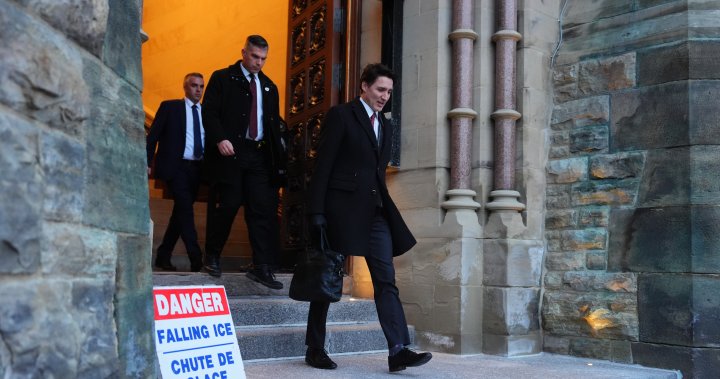Canada appears headed for a spring election now that the NDP pledges to vote out the government early next year – whether it’s the Prime Minister Justin Trudeau stays on or not.
Political observers are buzzing about possible scenarios that could play out in the coming year after last week’s drama that rocked the Trudeau government, and a national campaign in the spring is the quickest to come to fruition .
The exact timing is still uncertain, but the best bet is that the government falls by the end of March, and general election day then falls in April or May, said Yaroslav Baran, co-founder of the Pendulum Group and former chief of staff to Conservative House leader Jay Hill.
“The greatest likelihood would be that the government falls at some point between the end of February and the end of March,” he said, making April or May the “most likely scenario” for election day.
If the government falls following a vote of no confidence, the Prime Minister would then be obliged to approach Governor General Mary Simon to inform and advise her on the election schedule. The duration of a campaign is a minimum of 36 days and a maximum of 50 days, according to Elections Canada.
Events in Ottawa last week appear to have moved forward about five months in the political calendar, since the sudden resignation of Finance Minister and Deputy Prime Minister Chrystia Freeland dealt a major blow to Trudeau’s hold on the party and renewed the internal conflict. put pressure on him to resign as leader.
Trudeau is now reportedly thinking about his future. The prime minister’s office did not respond Monday when asked about his plans for the holiday.

NDP Leader Jagmeet Singh has promised he will help defeat the ruling Liberals in a confidence vote when the House returns. The Conservatives, well ahead in the polls, have been demanding elections all fall, while the Bloc has also recently called an election early in the new year.
Singh could still change his mind and many scenarios remain possible, such as an opposition party negotiating a major piece of the budget and then holding elections in the fall as planned, but this is looking increasingly less tenable.

Get the latest national news
For news impacting Canada and around the world, sign up to receive breaking news alerts sent directly to you as they happen.
“It doesn’t really make sense anymore to make a deal and be a partner with the government that you’re about to vilify a few months later as public enemy No. 1. 1,” Baran said.
“Clearly, the Liberals no longer have the support of any opposition party. So the likelihood of a spring election is high, whether the government prorogues or not,” said Brittney Kerr, founding partner of Framepoint Public Affairs and former co-chair of the 2019 Liberal campaign.
“No one at the center (in the Prime Minister’s Office) will be unaware of how complex the political equation is to win, given the overwhelming public opinion in favor of the Conservatives, coupled with the Prime Minister’s long tenure. »
The government can always prorogue Parliament, which would put Parliament into a deep winter sleep for several months. This would provide room for a leadership race if Trudeau decides to step down.

But Baran said such a move would not take him far given that opposition parties now all appear set to go to the polls and Parliament must return shortly to approve the finances and continue paying the officials – and face the music on these key votes.
“If the Prime Minister prorogues, this allows him to not have to appear in Parliament on January 27. “It can therefore gain time to plan, regroup, etc., but it would be really difficult for this extension period to last beyond the end of March.”
A leadership race would be a rushed affair compared to Liberal Party races in the past. When Trudeau was elected leader in 2013, the race lasted about six months, although in 1993 the Progressive Conservatives elected Kim Campbell after a race of about three months.
Former Privy Council Secretary Michael Wernick said proroguing just as Donald Trump is sworn in as president on Jan. 20 would shut down Parliament at a bad time — eliminating options to respond to d possible sudden trade measures that could harm Canada.
“The question is not whether the Prime Minister can prorogue. It’s a question of whether he should. My feeling is that it would be a very bad choice to drop our shields before January 20th. I think we may need Parliament to be present and functional.

The Liberals have woven a narrative that an experienced government must be in place to deal with an unpredictable Trump, and opposition parties also argue that the public should choose a stronger leader than Trudeau to deal with an aggressive Trump. the White House.
Wernick said Canada should seek to end its elections as early as possible in the year rather than later.
“The best thing for the country would be to finish the election as soon as possible and make it very clear who Canadians have chosen to lead us,” he said. “The more we prolong this spectacle and this house of cards – who has the legitimacy, who has the trust, who is the leader, who is going to be the successor – the more dragging this out weakens the country.”
Wernick suggested that the political parties could, given the high stakes of the Trump presidency, reach a sort of partisan ceasefire agreement to pass as much legislation as possible in a few weeks, such as Bill C -65 which would change Canadian elections. Take action, then organize their vote of confidence that will trigger the election.
“Republicans and Democrats can negotiate in Washington. Our parties surely can.
© 2024 The Canadian Press





